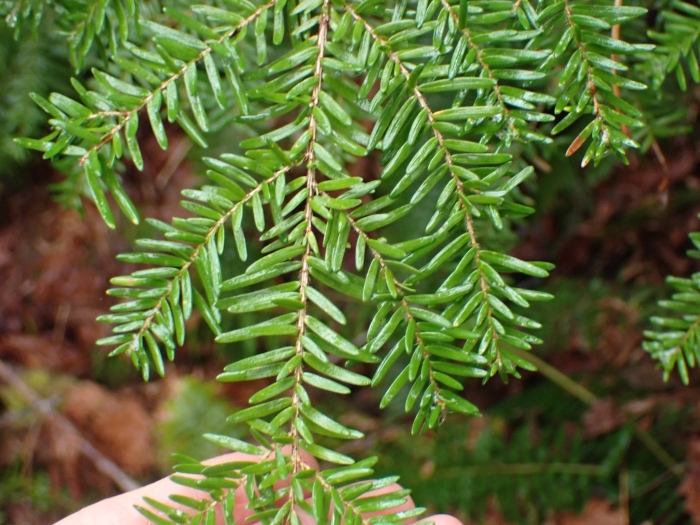Western Hemlock
(Tsuga heterophylla)
Western Hemlock (Tsuga heterophylla)
/
/

Ellyne Geurts
Public Domain
Image By:
Ellyne Geurts
Recorded By:
Copyright:
Public Domain
Copyright Notice:
Photo by: Ellyne Geurts | License Type: Public Domain | License URL: http://creativecommons.org/publicdomain/zero/1.0/ | Rights Holder: Ellyne Geurts | Publisher: iNaturalist | Date Created: 2021-04-28T16:29:51-07:00 |































































































Estimated Native Range
Summary
Tsuga heterophylla, commonly known as Western Hemlock, is an evergreen tree native to the moist coniferous forests of the Pacific Northwest, including the Western USA and British Columbia. It is the largest species of hemlock, with mature trees typically reaching heights of 50–70 meters (165–230 feet). The tree’s form includes a conical crown with drooping branch tips, which is a distinctive feature. The shoots are pale buff-brown, almost white, with a light pubescence. Its needles are short and rounded at the tips, contributing to a feathery appearance. Western Hemlock is notable for its deep green foliage that provides year-round interest and its tolerance for shade, making it a valuable addition to forest understories and shaded garden areas.
In cultivation, Western Hemlock is appreciated for its adaptability to a range of soil conditions, provided they are moist and acidic with a high level of organic matter. It is often used in large-scale landscapes, such as parks and botanical gardens, and has earned the Royal Horticultural Society’s Award of Garden Merit. While it thrives in part to full shade, it can also tolerate sunnier spots if sufficient moisture is available. Gardeners should be aware that young trees may require protection from frost and strong winds. Western Hemlock is susceptible to hemlock woolly adelgid, an invasive pest that can cause significant damage. It is also prone to root rot in poorly drained soils. Despite these potential issues, its shade tolerance and attractive foliage make it a desirable ornamental tree.CC BY-SA 4.0
In cultivation, Western Hemlock is appreciated for its adaptability to a range of soil conditions, provided they are moist and acidic with a high level of organic matter. It is often used in large-scale landscapes, such as parks and botanical gardens, and has earned the Royal Horticultural Society’s Award of Garden Merit. While it thrives in part to full shade, it can also tolerate sunnier spots if sufficient moisture is available. Gardeners should be aware that young trees may require protection from frost and strong winds. Western Hemlock is susceptible to hemlock woolly adelgid, an invasive pest that can cause significant damage. It is also prone to root rot in poorly drained soils. Despite these potential issues, its shade tolerance and attractive foliage make it a desirable ornamental tree.CC BY-SA 4.0
Plant Description
- Plant Type: Tree
- Height: 60-100 feet
- Width: 15-30 feet
- Growth Rate: Slow
- Flower Color: N/A
- Flowering Season: Non-Flowering
- Leaf Retention: Evergreen
Growth Requirements
- Sun: Part Shade, Full Shade
- Water: Medium
- Drainage: Medium
Common Uses
Bird Garden, Fragrant, Hedges, Salt Tolerant
Natural Habitat
Moist coniferous forests of the Pacific Northwest
Other Names
Common Names: Pacific Hemlock, Western Hemlock-Spruce, Skarntydegran, Pruche De L’Ouest, Hemlock De L’Ouest, Tsuga De Californie, Tsuga De L’Ouest, Tsuga Eterofilla, Vestamerikansk Hemlokk, Westelijke Hemlockspar, Jättehemlock
Scientific Names: , Tsuga heterophylla, Tsuga albertiana, Abies albertiana, Abies bridgesii, Abies heterophylla, Abies microphylla, Pinus pattoniana,
GBIF Accepted Name: Tsuga heterophylla (Raf.) Sarg.